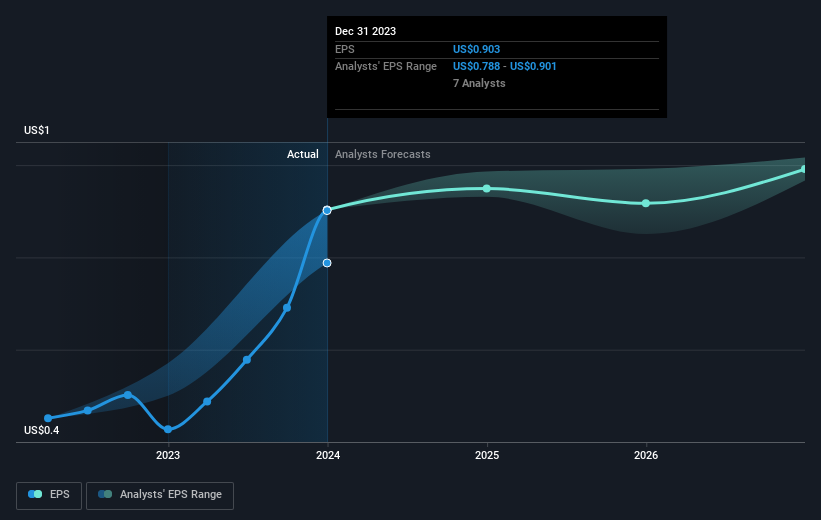Stock Analysis
- Mexico
- /
- Basic Materials
- /
- BMV:GCC *
GCC. de's (BMV:GCC) five-year earnings growth trails the 14% YoY shareholder returns

Generally speaking the aim of active stock picking is to find companies that provide returns that are superior to the market average. And while active stock picking involves risks (and requires diversification) it can also provide excess returns. For example, long term GCC, S.A.B. de C.V. (BMV:GCC) shareholders have enjoyed a 84% share price rise over the last half decade, well in excess of the market return of around 35% (not including dividends). On the other hand, the more recent gains haven't been so impressive, with shareholders gaining just 44% , including dividends .
Since the stock has added Mex$2.7b to its market cap in the past week alone, let's see if underlying performance has been driving long-term returns.
Check out our latest analysis for GCC. de
While the efficient markets hypothesis continues to be taught by some, it has been proven that markets are over-reactive dynamic systems, and investors are not always rational. One flawed but reasonable way to assess how sentiment around a company has changed is to compare the earnings per share (EPS) with the share price.
Over half a decade, GCC. de managed to grow its earnings per share at 23% a year. The EPS growth is more impressive than the yearly share price gain of 13% over the same period. So it seems the market isn't so enthusiastic about the stock these days.
You can see below how EPS has changed over time (discover the exact values by clicking on the image).

We know that GCC. de has improved its bottom line over the last three years, but what does the future have in store? If you are thinking of buying or selling GCC. de stock, you should check out this FREE detailed report on its balance sheet.
What About Dividends?
As well as measuring the share price return, investors should also consider the total shareholder return (TSR). Whereas the share price return only reflects the change in the share price, the TSR includes the value of dividends (assuming they were reinvested) and the benefit of any discounted capital raising or spin-off. So for companies that pay a generous dividend, the TSR is often a lot higher than the share price return. We note that for GCC. de the TSR over the last 5 years was 91%, which is better than the share price return mentioned above. This is largely a result of its dividend payments!
A Different Perspective
It's good to see that GCC. de has rewarded shareholders with a total shareholder return of 44% in the last twelve months. And that does include the dividend. Since the one-year TSR is better than the five-year TSR (the latter coming in at 14% per year), it would seem that the stock's performance has improved in recent times. Someone with an optimistic perspective could view the recent improvement in TSR as indicating that the business itself is getting better with time. Before forming an opinion on GCC. de you might want to consider these 3 valuation metrics.
We will like GCC. de better if we see some big insider buys. While we wait, check out this free list of growing companies with considerable, recent, insider buying.
Please note, the market returns quoted in this article reflect the market weighted average returns of stocks that currently trade on Mexican exchanges.
Valuation is complex, but we're helping make it simple.
Find out whether GCC. de is potentially over or undervalued by checking out our comprehensive analysis, which includes fair value estimates, risks and warnings, dividends, insider transactions and financial health.
View the Free AnalysisHave feedback on this article? Concerned about the content? Get in touch with us directly. Alternatively, email editorial-team (at) simplywallst.com.
This article by Simply Wall St is general in nature. We provide commentary based on historical data and analyst forecasts only using an unbiased methodology and our articles are not intended to be financial advice. It does not constitute a recommendation to buy or sell any stock, and does not take account of your objectives, or your financial situation. We aim to bring you long-term focused analysis driven by fundamental data. Note that our analysis may not factor in the latest price-sensitive company announcements or qualitative material. Simply Wall St has no position in any stocks mentioned.
About BMV:GCC *
GCC. de
GCC, S.A.B. de C.V., through its subsidiaries, produces, distributes, and sells gray Portland cement, ready-mix concrete, aggregates, and other building construction materials in Mexico and the United States.
Flawless balance sheet with solid track record.

